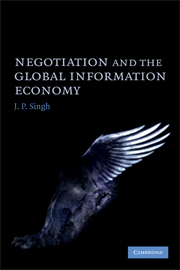Crossref Citations
This Book has been
cited by the following publications. This list is generated based on data provided by Crossref.
Singh, J. P.
2009.
Tania Voon, Cultural Products and the World Trade Organization.
Journal of Cultural Economics,
Vol. 33,
Issue. 2,
p.
161.
Hosman, Laura
2009.
Dividing the Oils: Dynamic Bargaining as Policy Formation in the Nigerian Petroleum Industry.
Review of Policy Research,
Vol. 26,
Issue. 5,
p.
609.
Singh, J P
2009.
Multilateral Approaches to Deliberating Internet Governance.
Policy & Internet,
Vol. 1,
Issue. 1,
p.
91.
Roy, Martin
2010.
Political Economy of Multilateral Commitments on Trade in Services: Democracy and Endowments.
SSRN Electronic Journal,
McCarthy, Daniel R.
2011.
Open Networks and the Open Door: American Foreign Policy and the Narration of the Internet1.
Foreign Policy Analysis,
Vol. 7,
Issue. 1,
p.
89.
Padovani, Claudia
and
Pavan, Elena
2011.
The Handbook of Global Media and Communication Policy.
p.
543.
Kirkup, Alex
2011.
Liberal Silences and the Political Economy of Global Governance.
Political Studies Review,
Vol. 9,
Issue. 1,
p.
13.
Zartman, I. William
2012.
La multilatéralité internationale.
Négociations,
Vol. n° 17,
Issue. 1,
p.
37.
Burri, Mira
and
Cottier, Thomas
2012.
Trade Governance in the Digital Age.
p.
1.
Singh, J. P.
2013.
Information Technologies, Meta-power, and Transformations in Global Politics.
International Studies Review,
Vol. 15,
Issue. 1,
p.
5.
da Conceição-Heldt, Eugénia
2013.
Two-level games and trade cooperation: What do we now know?.
International Politics,
Vol. 50,
Issue. 4,
p.
579.
da Conceição-Heldt, Eugénia
2013.
Emerging Powers in WTO Negotiations: The Domestic Sources of Trade Policy Preferences.
The International Trade Journal,
Vol. 27,
Issue. 5,
p.
431.
Epstein, Dmitry
2013.
The Making of Institutions of Information Governance: The Case of the Internet Governance Forum.
Journal of Information Technology,
Vol. 28,
Issue. 2,
p.
137.
Christou, George
and
Simpson, Seamus
2014.
Shaping the global communications milieu: The EU's influence on Internet and telecommunications governance.
Comparative European Politics,
Vol. 12,
Issue. 1,
p.
54.
Burri, Mira
2014.
The Palgrave Handbook of European Media Policy.
p.
479.
Singh, J. P.
2014.
Cultural Networks and UNESCO: Fostering Heritage Preservation Betwixt Idealism and Participation.
Heritage & Society,
Vol. 7,
Issue. 1,
p.
18.
Rodine‐Hardy, Kirsten
2015.
Globalization, International Organizations, and Telecommunications.
Review of Policy Research,
Vol. 32,
Issue. 5,
p.
517.
Singh, J. P.
2015.
Deliberation and Development: Rethinking the Role of Voice and Collective Action in Unequal Societies.
p.
193.
Singh, J.P.
and
Gupta, Surupa
2016.
Agriculture and Its Discontents: Coalitional Politics at the wto with Special Reference to India’s Food Security Interests.
International Negotiation,
Vol. 21,
Issue. 2,
p.
295.
Zamorano, Mariano Martín
2016.
Reframing Cultural Diplomacy: The Instrumentalization of Culture under the Soft Power Theory.
Culture Unbound,
Vol. 8,
Issue. 2,
p.
165.





